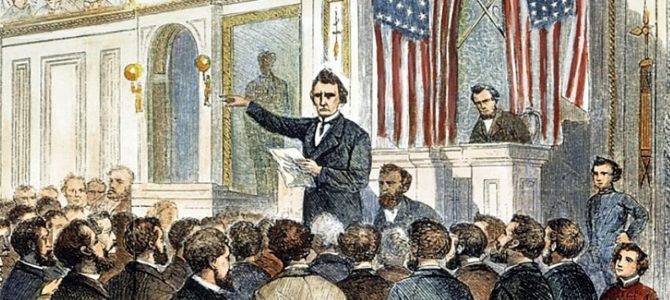
On Jan. 22, the Wall Street Journal published Princeton University professor of politics Keith E. Whittington’s defense of the disqualification-from-future-office purpose of the Senate impeachment trial of Donald Trump scheduled to begin on Feb. 8. The day before, more than 100 legal scholars, including Federalist Society co-founder Steven Calabresi, released a statement making the same argument.
Whittington holds that “for the Founders,” a Senate trial merely to “disqualify” a former federal official was a “traditionally understood” principle “imported to America from England.” Likewise, the scholars argue that “history,” including “English impeachment” history as well as the intentions of “the Framers” of the Constitution, is the source of the alleged constitutional power to convict “prior officeholders as well as current ones.” What is more, a Constitution without an independent disqualification power would be a Constitution that could be “easily undermined.”
In support of their scholarship, neither the scholars nor the professor cites nor quotes the “Federalist Papers.” Yet the “history” and meaning of the American Constitution begins with and is dependent on those papers which, like the Constitution itself, are unique in all of human and political history. Impeachment is dealt with in eight of the 85 papers (numbers 39, 65, 66, 69, 77, 79, 81, 84). Nowhere in any of the Federalist Papers is there a discussion of or attempt to separate between the two impeachment punishments of removal and disqualification.
In “Federalist No. 65,” whose subject is the suitability of the Senate as the court of impeachment, disqualification is not separately considered. The subject of “Federalist No. 66” is the argument that the impeachment provisions dangerously combine both legislative and judicial authority in the Congress.
Hamilton, the author, answers by pointing to the constitutional requirement that the House and Senate act separately and independently in the impeachment process. When Hamilton contends impeachment is properly assigned to the Congress, rather than the Supreme Court, “disqualification” is not mentioned at all. In neither paper is there a discussion distinguishing between “removal from office” and “disqualification.”
In “Federalist No. 39,” Madison says that “the President of the United States is impeachable at any time during his continuance in office.” In “Federalist No. 66,” Hamilton explains that the fundamental purpose of impeachment is to protect the Congress against “encroachments of the executive.” Obviously, there can be no such encroachments by a former executive.
It is inconceivable that the Federalist authors — who were, of course, subject to the criticisms of and corrections by their fellow Founders — would have left such a major constitutional power, the stand-alone power of disqualification, uncommented on. Both the assumption and the plain text of the Constitution and the “Federalist Papers” is that the two punishments, removal and disqualification, go together.
For Democrats intent on keeping their fierce pursuit of Trump in the public eye, the Constitution establishes more powerful means than simple removal and disqualification. Article I, 3 states that impeachment shall not extend “further than” than removal and disqualification, “but the party convicted shall nevertheless be liable and subject to Indictment, Trial, Judgment, and Punishment, according to law.” And he need not be “convicted” under impeachment.
In specifically discussing the presidency in “Federalist No. 65” and “Federalist No. 69,” Hamilton points out that a former president would “afterwards” — that is, after he is no longer president — be “liable to prosecution and punishment in the ordinary course of law.” Hamilton highlights this dramatic difference from English law concerning “the person of the king,” who is forever exempt from impeachment and prosecution.
During his term in office, a president may not be prosecuted in an outside court, only charged/impeached by the House and convicted by the Senate of “High Crimes and Misdemeanors.” Now that he is out of office, however, and for the rest of his life, Trump may be criminally indicted in any state or federal court for anything he ever did both during and outside his presidency.
In Nixon v. Fitzgerald, the Supreme Court ruled that a president is forever immune from civil liability for his official acts while in office. Not so, however, for non-official civil acts. In Clinton v. Jones, the Supreme Court held that a sitting president may be sued for his private, non-official pre-presidency conduct. Furthermore, in the 2020 decision of Trump v. Vance, the Supreme Court ruled that Trump’s tax records could be subpoenaed by New York state prosecutor Cyrus Vance Jr. while he was still in office.
Both the scholars and the professor mention that a perfidious president or other officials could commit heinous acts against the country and the government and then avoid all consequences by resigning before an impeachment trial. As already pointed out and proven by the text of the Constitution and Hamilton’s discussion of it, this contention is simply false.
Such a terminally criminal former president would continue to be liable to criminal prosecution for his in-office, terminally criminal acts. What is more, it is more than obvious that American popular and political opinion would never endure an attempt by such a person to regain public office. Finally, it is also refuted by American history insofar as no public figure has ever thought to commit such acts.
The scholars and Whittington bring up the impeachment and disqualification of resigned and no-longer-in-office Secretary of War William Belknap in 1876, who was acquitted in the Senate. But historical accounts are readily available with which to conclude that a significant number of those voting for acquittal had already decided that there was no impeachment jurisdiction over a former official. Also, of course, Belknap was an appointed official rather than an elected one, much less the president.
In a separate article in The New York Times, Calabresi along with Norman Eisen, one of the Democrats’s House 2020 impeachment counsels, have cited no authority for their unique claim that after the two-thirds impeachment vote, a disqualification vote “only requires a simple majority” vote in the Senate. Anyone is entitled to his or her opinion about the meaning of constitutional texts, of course. “Scholarship,” however, requires something more.









